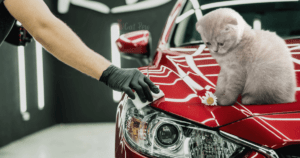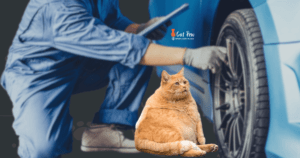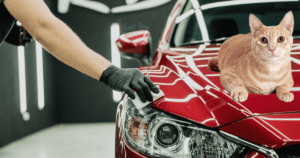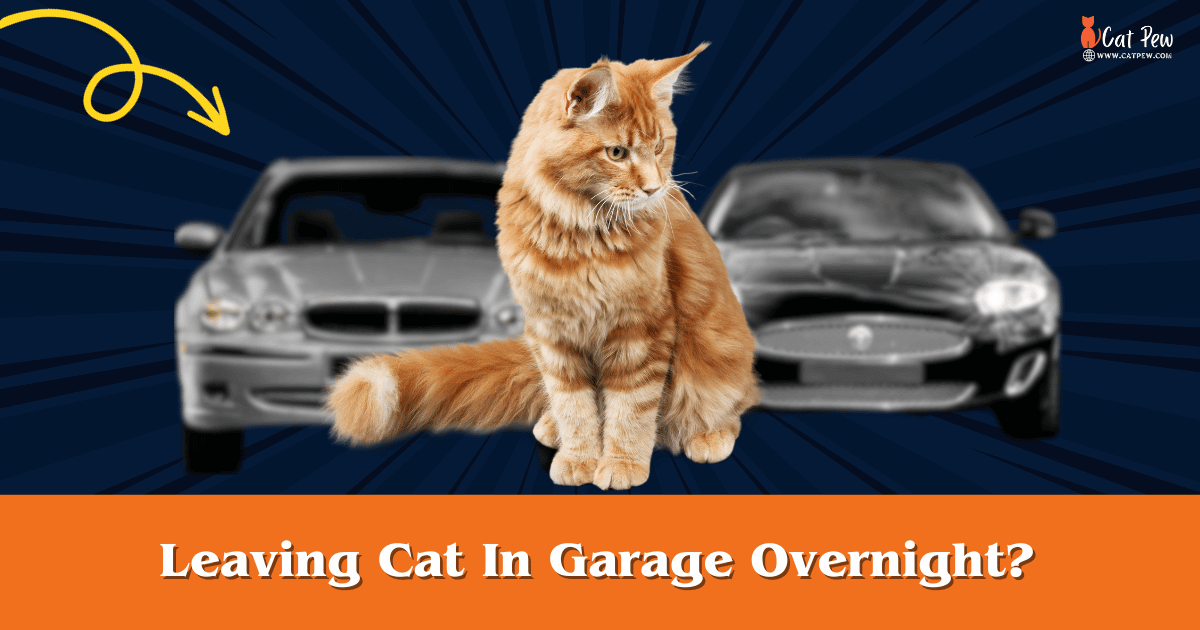Leaving Cat In Garage Overnight?
Leaving a cat in the garage overnight can be dangerous and potentially harmful to the cat’s health and well-being. The enclosed space may have limited ventilation, temperature extremes, and potential hazards that can pose risks to the cat’s safety.
It is important to ensure that your cat has a comfortable and safe environment indoors, with access to food, water, litter, and a cozy place to sleep. Taking the necessary precautions and providing proper care will help keep your cat happy and healthy.
The Potential Dangers Of Leaving Your Cat Alone In The Garage

Leaving your cat alone in the garage overnight may seem like a convenient solution, especially if you need to keep your feline friend contained or away from other pets. However, it’s important to understand that the garage can pose several risks to your cat’s safety and well-being. In this article, we will explore the potential dangers that come with leaving your cat alone in the garage.
Risks Of Exposure To Extreme Temperatures
One of the major risks of leaving your cat in the garage overnight is exposure to extreme temperatures. Depending on the climate in your area, the garage can become scorching hot or freezing cold, which can be dangerous for your cat. Extreme heat can lead to heatstroke, dehydration, and organ damage, while extreme cold can cause hypothermia and frostbite. It’s crucial to remember that cats are sensitive to temperature changes and may not be able to regulate their body temperature effectively.
Limited Air Circulation
Another danger of leaving your cat alone in the garage is the limited air circulation. Garages are often poorly ventilated spaces that lack proper airflow. Without adequate ventilation, the air in the garage can become stagnant and filled with dust, fumes, or toxins. This can lead to respiratory problems for your feline friend, especially if they have existing respiratory conditions such as asthma or allergies. Limited air circulation can also contribute to a buildup of pollutants and allergens, which can have adverse effects on your cat’s health.
Toxic Substances In The Garage
Additionally, the garage can harbor various toxic substances that can be harmful if ingested or inhaled by your cat. From automotive chemicals, such as antifreeze and motor oil, to pesticides, herbicides, and cleaning products, these substances can pose a significant risk to your cat’s health and well-being. Cats are curious creatures known for their tendency to explore and consume things that may not be safe for them. Ingesting or coming into contact with these toxic substances can lead to poisoning, organ damage, or even fatality.
Given the potential dangers associated with leaving your cat alone in the garage overnight, it’s essential to prioritize their safety and well-being. Instead of confining them to the garage, consider creating a safe and comfortable indoor space for your cat, or provide a secure outdoor enclosure. By ensuring that your cat is in a controlled environment where they are protected from extreme temperatures, has adequate air circulation, and is away from toxic substances, you can help keep them safe and healthy.
Creating A Safe And Comfortable Environment For Your Cat

Ensure the safety and comfort of your feline companion by avoiding leaving them in the garage overnight. Create a secure environment inside your home to provide your cat with the care and attention they deserve.
Creating a Safe and Comfortable Environment for Your Cat Leaving your beloved feline friend in the garage overnight can be a viable solution for pet owners, especially when they need a temporary space for their cats to sleep or spend some alone time. However, it’s essential to ensure that you create a safe and comfortable environment for your furry companion in the garage. By taking a few simple precautions, you can make the garage a cat-friendly space where your pet feels secure, content, and well taken care of. Here are some essential steps to follow to provide a safe and comfortable environment for your cat.
Providing Proper Ventilation
Good ventilation is crucial for your cat’s health and well-being when staying in the garage overnight. Ensure adequate airflow by opening windows or using fans if necessary. This will prevent the accumulation of stale air and maintain a fresh and comfortable environment for your feline friend. Additionally, make sure to check that there are no potential air leaks or drafts that could cause discomfort or harm to your pet.
Insulating The Garage
Insulation plays a vital role in creating a comfortable temperature for your cat in the garage, especially during extreme weather conditions. Consider insulating the walls and ceiling to regulate the temperature, keeping it warm in the winter and cool in the summer. This will help prevent your cat from becoming too hot or too cold during their stay in the garage. Insulation also helps to reduce noise levels, making the environment more peaceful and stress-free for your cat.
Ensuring Access To Food, Water, And Litter Box
Your cat’s essential needs must be met even when staying in the garage overnight. Make sure to provide easy access to fresh food and water, placing them in a safe and easily reachable spot. A table or a designated feeding area can help protect the bowls from any potential spills or contamination. Similarly, place the litter box in a quiet corner of the garage, ensuring your cat can easily find and use it at any time. Remember to regularly clean the litter box and change the water to maintain a hygienic environment for your furry friend. Additionally, consider placing a soft and comfortable bed or blanket for your cat to rest on, providing them with a cozy spot to relax during their overnight stay. In conclusion, when it comes to leaving your cat in the garage overnight, creating a safe and comfortable environment is of utmost importance. Adequate ventilation, insulation, and access to food, water, and a litter box are key factors to consider. By taking these precautions, you can ensure that your feline companion feels secure and content while spending time in the garage.
Preparing For The Overnight Stay: Essential Precautions

Leaving your beloved feline companion in the garage overnight can be a convenient solution for both you and your cat. However, it’s essential to take certain precautions to ensure your furry friend stays safe and comfortable. By following these essential steps, you can create a secure and cat-friendly environment in your garage. Let’s dive in!
Securing Hazardous Items And Chemicals
One of the first and most crucial steps in preparing your garage for your cat’s overnight stay is to secure any hazardous items or chemicals. Your garage might be a storage space for various potentially dangerous substances, such as cleaning products, pesticides, fertilizers, or sharp tools. To prevent any accidents or harm to your cat, be sure to:
- Keep all hazardous items locked away in cabinets or on high shelves that are out of your cat’s reach. This will minimize the risk of your cat coming into contact with harmful substances or injuring itself on sharp objects.
- If possible, consider transferring any chemicals or toxic materials to a different location entirely, away from your cat’s reach. This extra precaution can provide further peace of mind.
- Ensure that all electrical cables and wires are safely tucked away and not exposed. Cats, being curious creatures, may be prone to chewing on cables, which can pose a safety hazard.
Making The Space Cat-friendly And Cozy
While your garage may not be the most conventional sleeping spot for a cat, you can make it a cozy and inviting space by implementing a few simple changes. Here’s how:
- Create a designated area for your cat to sleep and relax. This can be a soft bed or blanket placed in a quiet corner of the garage.
- Consider installing a small scratching post or providing a sturdy scratching board to satisfy your cat’s instinct to scratch.
- Ensure the temperature in the garage remains comfortable throughout the night. If it gets too cold, provide extra warmth with a heated pet bed or cozy blanket. Alternatively, if it’s hot, ensure proper ventilation and provide access to fresh water.
- Provide entertainment and mental stimulation for your cat during the overnight stay. Leave some interactive toys or puzzle feeders filled with treats to keep your furry friend engaged and occupied.
Exploring Alternative Accommodation Options
If you’re unsure about leaving your cat in the garage overnight or if the weather conditions are extreme, it’s worth considering alternative accommodation options. Here are a few alternatives to explore:
- Request a trusted friend, family member, or neighbor to look after your cat at their home.
- Arrange for a professional cat sitter to visit your home and take care of your cat while you’re away.
- Look into boarding facilities specifically designed for cats. These facilities can provide a safe and comfortable environment for your cat, complete with individualized care and attention.
By taking these essential precautions, you can ensure the safety and well-being of your feline friend during an overnight stay in the garage. Remember, a secure and inviting space, free from hazards and with all their basic needs met, will help your cat feel comfortable and content throughout the night. Happy cat, happy owner!
Monitoring Your Cat’s Well-being Throughout The Night

Leaving your cat in the garage overnight can sometimes be necessary, but ensuring your furry friend stays safe and comfortable is of the utmost importance. One key aspect of this is monitoring your cat’s well-being throughout the night. By regularly checking the temperature and humidity, keeping an eye out for signs of distress or health issues, and enriching the environment to prevent boredom, you can ensure your cat’s well-being even when they are spending the night in the garage.
Regularly Checking Temperature And Humidity
Monitoring the temperature and humidity levels in your garage is crucial to safeguarding your cat’s well-being. Extreme temperatures can have a significant impact on their comfort and health. Ensure that the garage remains within a moderate temperature range, typically between 60°F and 80°F (15°C to 27°C), to prevent your cat from becoming too hot or too cold.
Here are some tips for monitoring and maintaining suitable temperature and humidity levels:
1. Use a thermometer and humidity monitor: Place a thermometer and hygrometer in the garage to accurately track temperature and humidity levels. This way, you can quickly identify any sudden changes or variations that may impact your cat’s comfort.
2. Insulate the garage: Proper insulation can help maintain a stable temperature inside the garage. Install weather stripping on doors and windows to prevent drafts, and consider adding insulation to the walls or ceiling if necessary.
3. Provide adequate ventilation: Ensure that the garage is properly ventilated to prevent stale air and excess moisture buildup. Proper airflow can help maintain a comfortable and healthy environment for your cat.
Keeping An Eye On Signs Of Distress Or Health Issues
Your cat’s well-being involves more than just temperature and humidity. It’s essential to actively monitor their behavior and physical state throughout the night to ensure they are not experiencing distress or health issues.
Here are some signs to be vigilant for:
| Physical Signs | Behavioral Signs |
|---|---|
|
|
|
|
If you notice any of these signs, it’s crucial to intervene and take the necessary steps to ensure your cat’s well-being. If unsure, consult your veterinarian for guidance.
Enriching The Environment To Prevent Boredom
Boredom can lead to stress and anxiety for cats, especially during extended periods in a confined space like a garage. To keep your cat stimulated and entertained, it’s important to enrich their environment.
- Create a cozy resting area:
- Provide soft bedding or blankets in a comfortable spot to encourage relaxation.
- Include familiar items with your cat’s scent, like a favorite toy or a piece of clothing.
- Provide interactive toys:
- Place a cat tree or scratching post to allow climbing and scratching.
- Provide puzzle toys or treat-dispensing toys to stimulate their mental and physical abilities.
- Consider soothing sounds:
- Play calming music or use white noise machines to help create a soothing ambiance.
- Avoid loud or sudden noises that may startle or stress your cat.
By implementing these strategies, you can ensure your cat remains engaged and mentally stimulated, reducing the likelihood of boredom or anxiety during their time in the garage.
The Importance Of Seeking Professional Advice

The importance of seeking professional advice when it comes to leaving your cat in the garage overnight cannot be overstated. As a responsible pet owner, it is crucial to prioritize the well-being and safety of your furry friend. In this section, we will explore why consulting with a veterinarian, discussing concerns getting recommendations, and exploring alternatives are vital steps in ensuring the health and happiness of your cat.
Consulting With A Veterinarian
Before making any decisions about leaving your cat in the garage overnight, it is essential to consult with a veterinarian. Veterinarians are experts in animal healthcare and can provide valuable insights specific to your cat’s needs. They can assess the condition and behavior of your cat and offer appropriate advice and guidance.
Discussing Concerns And Getting Recommendations
During your consultation with a veterinarian, it is crucial to discuss any concerns you may have regarding leaving your cat in the garage overnight. By having an open and honest conversation, you can address any potential risks, assess the suitability of this arrangement, and get recommendations for alternative options.
Through this conversation, the veterinarian can consider factors such as your cat’s age, health conditions, temperament, and even the weather conditions of your area. They can provide you with personalized advice, taking into account any specific requirements your cat may have.
Exploring Alternatives To Leaving The Cat Alone In The Garage Overnight
While leaving your cat in the garage overnight may seem like a convenient option, it is important to explore alternatives that prioritize their well-being. Consulting with a veterinarian can help you discover various alternatives tailored to your cat’s needs.
This could include finding a trusted pet sitter or boarding facility, where your cat can be in a safe and comfortable environment. You may also consider providing an indoor space within your home specifically designed for your cat, complete with essential amenities, toys, and a cozy sleeping area.
By exploring alternatives, you can ensure that your cat receives the attention, care, and companionship they require, even when you are away overnight.
Frequently Asked Questions On Leaving Cat In Garage Overnight
Can Cats Stay In Unheated Garage?
Yes, cats can stay in an unheated garage, but it’s not ideal for their comfort and well-being, especially in extreme temperatures. Provide warm bedding, and shelter, and ensure the garage is well-insulated. Monitor the temperature regularly and make sure it stays within a safe range for the cat’s health.
Is It Okay To Leave A Cat Alone Overnight?
Yes, it is generally okay to leave a cat alone overnight. Ensure they have enough food and water, a clean litter box, and a safe, comfortable environment. However, it is important to consider your cat’s individual needs and temperament before making this decision.
How Do I Make My Garage Safe For Cats?
To make your garage safe for cats, follow these steps: 1. Clear clutter to prevent accidents or injury. 2. Store harmful substances out of reach, like chemicals or sharp tools. 3. Check for any small openings or holes that cats could escape from.
4. Secure loose wiring and cords to avoid strangulation hazards. 5. Create a comfortable space with a bed, food, water, and toys for your cat’s needs.
Is It OK to Keep Cats Indoors At Night?
Yes, it is perfectly fine to keep cats indoors at night. It protects from outdoor dangers like traffic and predators, helps prevent accidents, and ensures their well-being.
Conclusion
To ensure the safety and well-being of your furry friend, it is crucial to avoid leaving your cat in the garage overnight. Garages pose various risks, such as extreme temperatures, toxic substances, and potential mechanical hazards. Instead, provide your cat with a comfortable and secure indoor environment, allowing them to roam freely without any potential harm.
Remember, your cat’s safety should always be a top priority.

Winston
I'm Winston, the author of this feline-focused (Catpew.com) blog . My love for cats goes back to my childhood, when I spent countless hours playing with my family's tabby, Mittens. This furry friend instilled in me a deep appreciation for the unique personalities, playful nature, and unconditional love that cats offer.

